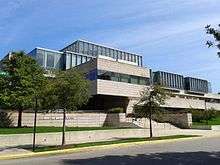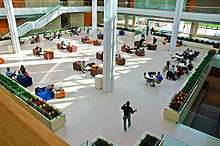University of Chicago Booth School of Business
 | |
| Motto | Crescat scientia; vita excolatur (Latin) |
|---|---|
Motto in English | Let knowledge grow from more to more; and so be human life enriched[1] |
| Type | Private business school |
| Established | 1898 |
| Endowment | US $1.034 billion [2] |
| Dean | Madhav V. Rajan |
Academic staff | 211 (156: tenure track) [3] |
| Postgraduates | 3297 [3] |
| Location | Chicago, Illinois, United States |
| Alumni | 52,000 [3] |
| Colors |
Maroon and White |
| Affiliations | University of Chicago |
| Mascot | Phoenix |
| Website |
www |
The University of Chicago Booth School of Business (also known as Chicago Booth, or Booth) is the graduate business school of the University of Chicago in Chicago, Illinois. Booth has produced more Nobel Laureates in the Economic Sciences (28)[4] than any other school and is second only to the University of Cambridge in total. Formerly known as The University of Chicago Graduate School of Business, Chicago Booth is the second-oldest business school in the U.S.,[5] the first such school to offer an Executive MBA program,[6] and the first to initiate a Ph.D. program in business.[5] The school was renamed in 2008 following a $300 million endowment gift to the school by alumnus David G. Booth. The school has the third-largest endowment of any business school.[7]
The school's campus is located in the Hyde Park neighborhood of Chicago on the main campus of the university. The school also maintains additional campuses in London and Asia (originally Singapore, but in July 2013 a move to Hong Kong was announced),[8][9] as well as in downtown Chicago on the Magnificent Mile. In addition to conducting graduate business programs, the school conducts research in the fields of finance, economics, quantitative marketing research, and accounting. Chicago Booth's MBA program is currently tied in first with Harvard Business School according to U.S. News & World Report.[10]
History
The University of Chicago Booth School of Business traces its roots back to 1898 when university faculty member James Laurence Laughlin chartered the College of Commerce and Politics, which was intended to be an extension of the school's founding principles of "scientific guidance and investigation of great economic and social matters of everyday importance." The program originally served as a solely undergraduate institution until 1916, when academically oriented research masters and later doctoral-level degrees were introduced.
In 1916, the school was renamed the School of Commerce and Administration. Soon after in 1922, the first doctorate program was offered at the school. In 1932, the school was rechristened as the School of Business.[3] The School of Business offered its first Master of Business Administration (MBA) in 1935. A landmark decision was taken by the school at about this time to concentrate its resources solely on graduate programs, and accordingly, the undergraduate program was phased out in 1942. In 1943, the school launched the first Executive MBA program. The school was renamed to Graduate School of Business (or more popularly, the GSB) in 1959, a name that it held till 2008.
| Name | Tenure |
|---|---|
| Henry Rand Hatfield | 1902–1904 |
| Francis W. Shepardson | 1904-1906 |
| C.E. Merriam | 1907-1909 |
| Leon C. Marshall | 1909–1924 |
| William H. Spencer | 1924–1945 |
| Garfield V. Cox | 1945–1952 |
| John E. Jeuck | 1952–1955 |
| W. Allen Wallis | 1956–1962 |
| George P. Shultz | 1962–1969 |
| Sidney Davidson | 1969–1974 |
| Richard N. Rosett | 1974–1982 |
| John P. Gould | 1983–1993 |
| Robert S. Hamada | 1993–2001 |
| Edward A. "Ted" Snyder | 2001–2010 |
| Sunil Kumar | 2011-2016 |
| Madhav V. Rajan
(Interim dean Douglas J. Skinner) |
2017- |
During the later half of the twentieth century, the business school was instrumental in the development of the Chicago School of economics, an economic philosophy focused on free-market, minimal government involvement, due to faculty and student interaction with members of the university's influential Department of Economics. Other innovations by the school include initiating the first PhD program in business (1920), founding the first academic business journal (1928), offering the first Executive MBA (EMBA) program (1943), and for offering the first weekend MBA program (1986).[11][12] Students at the school founded the National Black MBA Association (1972), and it is the only U.S. business school with permanent campuses on three continents: Asia (2000), Europe (1994), and North America (1898).
Campuses
In Chicago, the Booth School has two campuses: the Charles M. Harper Center in Hyde Park, which hosts the school's full-time MBA and Ph.D. programs, and the Gleacher Center in downtown Chicago, which hosts evening, weekend, and executive MBA programs. Chicago Booth also has a campus in London across from the Guildhall and a campus in Hong Kong.[13]
Academics
Chicago Booth offers Full-time, Part-time (Evening and Weekend) and Executive MBA programs. The University is also a major center for educating future academics, with graduate programs offering the A.M. and Ph.D. degrees in several fields.
Academic concentrations
Students in the Full-time MBA, Executive MBA, and Part-time MBA programs can concentrate in one or more of 14 areas, although some concentrations' required coursework may necessitate schedule modifications for students enrolled in the part-time program. The areas are:
|
|
Honors
Chicago Booth grants "High Honors" to the top five percent of the graduating class and "Honors" to its next 15 percent, based on GPA averages of all MBA graduates from the previous academic year.[14]
Research and learning centers

The school promotes and disseminates research through its centers and institutes; the most significant ones are:[3]
- Accounting Research Center
- Applied Theory Initiative
- Center for Decision Research
- Center for Population Economics
- Center for Research in Security Prices
- Chicago Energy Initiative
- Fama-Miller Center for Research in Finance
- George J. Stigler Center for the Study of the Economy and the State
- Initiative on Global Markets
- Michael P. Polsky Center for Entrepreneurship and Innovation
- The Becker Friedman Institute for Research in Economics
- James M. Kilts Center for Marketing
- Rustandy Center for Social Sector Innovation
Rankings
| Business school rankings | |
|---|---|
| Worldwide overall | |
| Times Higher Education[15] | 4 |
| U.S. News & World Report[16] | 1 |
| Worldwide MBA | |
| Business Insider[17] | 2 |
| Economist[18] | 1 |
| Financial Times[19] | 6 |
| U.S. MBA | |
| Bloomberg Businessweek[20] | 3 |
| Forbes[21] | 6 |
| U.S. News & World Report[22] | 1 |
| Vault[23] | 3 |
U.S. News & World Report currently ranks Chicago Booth as the #1 business school (tied with Harvard Business School) in the United States.[24] U.S. News also ranked the school's executive MBA program #1[25] and its part-time program #2.[26] In 2017, The Economist ranked the school's full-time MBA program as #2 globally.[27] The Economist ranked Chicago #1 each year from 2012 to 2016.[27]
Bloomberg Businessweek ranked the school as the #1 business school in the United States in 2006, 2008, 2010, and 2012.[28] In 2017, Forbes magazine rated Booth as #7 among U.S. business schools.[29]
People
Faculty
The Booth school has 177 professors,[3] and includes Nobel laureates Eugene Fama and Richard Thaler, presidential appointees, and a MacArthur fellow.[30] Notable economists Kevin M. Murphy, John H. Cochrane, Luigi Zingales and Raghuram Rajan, and former Chairperson of the Council of Economic Advisers, Austan Goolsbee, are professors there.
Alumni
The Chicago Booth Alumni has a community of over 49,000 members [31] and is supported by 60+ alumni clubs worldwide.[32] Alumni include Satya Nadella, Jon Corzine, Peter G. Peterson, Philip J. Purcell, Todd Young, Howard Marks, Megan McArdle, John Meriwether, and Susan Wagner.
Publications
Chicago Booth Review
Chicago Booth Review is a magazine devoted to business research, particularly research conducted by Chicago Booth’s own faculty. In addition to covering new findings in finance, behavioral science, economics, entrepreneurship, accounting, marketing, and other business-relevant subjects, the magazine features essays from Chicago Booth faculty and other academics. It is published quarterly in print and several times a week online.
Chicago Booth Review is the most recent of several successive vehicles Chicago Booth has used to convey its intellectual capital to an outside audience. Starting in the 1960s, the school published the Selected Papers series, a collection of articles written by faculty members or excerpted from faculty speeches. In 1997, Booth launched Capital Ideas ( ISSN 1934-0060) as a separate newsletter featuring articles about faculty research. That subsequently evolved into a quarterly magazine, which in 2016 relaunched as Chicago Booth Review.
See also
References
- ↑ "About the University". The University of Chicago. 2007. Archived from the original on December 17, 2000. Retrieved April 20, 2007.
- ↑ "Dean's Annual Report 2014-2015". The University of Chicago. Retrieved March 22, 2016.
- 1 2 3 4 5 6 "Key Facts". The University of Chicago. Retrieved March 3, 2018.
- ↑ "Chicago Booth racks up yet another Nobel".
- 1 2 "Chicago Booth History". Booth School of Business. Retrieved September 6, 2009.
- ↑ "History of Executive MBA Council". Executive MBA Council (www.emba.org). Archived from the original on 2009-07-12.
- ↑ "Subtle Strategist". Financial Times, FT.com.
- ↑ U. of Chicago to Move Asia M.B.A. Program From Singapore to Hong Kong The Chronicle of Higher Education July 11, 2013
- ↑ "University of Chicago Moves Asia M.B.A. Program to Hong Kong from Singapore The School Cites 'Proximity to China' as a Prime Attraction" Wall Street Journal July 11, 2013
- ↑
- ↑
- ↑
- ↑ Chicago Booth Campuses, University of Chicago Booth School of Business.
- ↑ Honors, Booth School of Business, University of Chicago (last accessed March 21, 2017).
- ↑ "World University Rankings by subject: business and economics". Times Higher Education. 2016. Retrieved 2016-10-29.
- ↑ "Best Global Universities for Economics and Business". U.S. News & World Report. 2017. Retrieved 2017-03-15.
- ↑ "The 50 best business schools in the world". Business Insider. 2015. Retrieved 2016-02-06.
- ↑ "Full time MBA ranking". Economist. 2016. Retrieved 2017-03-15.
- ↑ "Global MBA Ranking". Financial Times. 2017. Retrieved 2017-01-31.
- ↑ "Best Business Schools 2017". Bloomberg Businessweek. 2018-03-12.
- ↑ "The Best Business Schools". Forbes. 2017. Retrieved 2018-03-12.
- ↑ "2019 Best Business Schools Rankings". U.S. News & World Report. March 20, 2018. Retrieved March 24, 2018.
- ↑ "Best Business Schools". Vault.com. 2017. Retrieved 2018-03-12.
- ↑ "2019 Best Business Schools".
- ↑ "Best Executive MBA Programs". U.S. News & World Report. 2018.
- ↑ "Best Part-time MBA Programs". U.S. News & World Report. 2018.
- 1 2 "Full-time mba ranking". The Economist.
- ↑ Bloomberg Businessweek: The Complete 2012 Business Schools Ranking, 2012-11-15
- ↑ "Best Business Schools 2017". Forbes. 2017.
- ↑ "Kevin Murphy Bio". The University of Chicago. 2017. Retrieved January 3, 2018.
- ↑ http://www.chicagobooth.edu/programs/full-time/student-experience/alumni-networkhttp://www.chicagobooth.edu/alumni/community/
- ↑ http://www.chicagobooth.edu/alumni/clubs/
External links
| Wikimedia Commons has media related to Booth School of Business. |
Coordinates: 41°47′21″N 87°35′45″W / 41.789144°N 87.595705°W